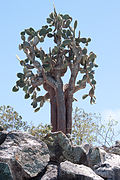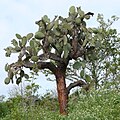| Opuntia galapageia | |
|---|---|

| |
| Conservation status | |
 Least Concern (IUCN 3.1) | |
| Scientific classification | |
| Kingdom: | Plantae |
| Clade: | Tracheophytes |
| Clade: | Angiosperms |
| Clade: | Eudicots |
| Order: | Caryophyllales |
| Family: | Cactaceae |
| Genus: | Opuntia |
| Species: | O. galapageia |
| Binomial name | |
| Opuntia galapageia Hensl. | |
| Infraspecific taxa | |
| Synonyms | |
As subtaxa:
| |
Opuntia galapageia is a species of cactus. It is endemic to the Galápagos Islands, part of Ecuador. Forms occurring on different islands have been treated as separate species and subtaxa of these species. Opuntia echios, Opuntia helleri, Opuntia insularis, Opuntia megasperma, Opuntia myriacantha and Opuntia saxicola are now sunk within O. galapageia.
Description
The variety Opuntia galapageia var. myriacantha, synonym Opuntia galapageia var. echios. has the most formidable spines; up to 10 inches (25 cm) in length.
Taxonomy

Opuntia galapageia was first described by John Stevens Henslow in 1837. It was first recorded by Charles Darwin on Santiago (James) Island. Darwin was ashore there for nine days in 1835. Subsequently, at least five other species of Opuntia were described from the Galápagos: Opuntia helleri, Opuntia insularis, Opuntia megasperma, Opuntia myriacantha and Opuntia saxicola. All were treated by David Hunt in 2006 as included within O. galapageia, a placement accepted by the IUCN Red List as of 2017, although they had been assessed as separate species in 2000. Plants of the World Online also accepts the placement within O. galapageia, and includes Opuntia echios, in most cases placing the species in an infraspecific taxon (see the list below).
Infraspecific taxa
A large number of varieties and other infraspecific taxa have been named. As of June 2021, Plants of the World Online accepts the following:
| Image | Name | Distribution |
|---|---|---|
 |
Opuntia galapageia subvar. barringtonensis (E.Y.Dawson) Backeb., syn. Opuntia echios var. barringtonensis E.Y.Dawson | Santa Fe |
 |
Opuntia galapageia var. gigantea (J.T.Howell) Backeb., syns. Opuntia echios var. gigantea (J.T.Howell) D.M.Porter, Opuntia echios subsp. gigantea J.T.Howell | Santa Cruz |
 |
Opuntia galapageia var. helleri (K.Schum. ex B.L.Rob.) Backeb., syn. Opuntia helleri K.Schum. | Darwin, Genovesa, Marchena, Wolf |
| Opuntia galapageia subvar. inermis (E.Y.Dawson) Backeb., syn. Opuntia echios var. inermis E.Y.Dawson | Isabela | |
 |
Opuntia galapageia var. insularis (A.Stewart) Backeb., syn. Opuntia insularis A.Stewart | Fernandina, Isabela |
| Opuntia galapageia var. macrocarpa E.Y.Dawson | Pinzon | |
| Opuntia galapageia var. myriacantha (F.A.C.Weber) Backeb., syns. Opuntia echios, Opuntia myriacantha F.A.C.Weber | ||
 |
Opuntia galapageia var. profusa E.F.Anderson & Walk. | Isabela, Santiago |
| Opuntia galapageia var. saxicola (J.T.Howell) Backeb., syn. Opuntia saxicola J.T.Howell | Isabela | |
 |
Opuntia galapageia var. zacana (J.T.Howell) Backeb., syns. Opuntia zacana J.T.Howell, Opuntia echios var. zacana (J.T.Howell) Backeb. | North Seymour |
Two other infraspecific taxa that have been named are not recognized by Plants of the World Online as distinct from the species:
- Opuntia galapageia var. brossettii Backeb.
- Opuntia galapageia subvar. orientalis (J.T.Howell) Backeb.
Distribution
Opuntia galapageia is endemic to the Galápagos Islands. Forms occurring on different islands have been described as subtaxa of the species (see the list above). Island distributions given by Plants of the World Online include:
- Fernandina
- O. galapageia var. insularis
- Isabela
- O. galapageia subvar. inermis
- O. galapageia var. insularis
- O. galapageia var. profusa
- O. galapageia var. saxicola
- Seymour
- O. galapageia var. zacana
- Pinzon
- O. galapageia var. macrocarpa
- Santa Cruz
- O. galapageia var. gigantea
- Santa Fe
- O. galapageia subvar. barringtonensis
- Santiago
- O. galapageia var. profusa
References
- ^ Tye, A.; Kling, M. (2017). "Opuntia galapageia". IUCN Red List of Threatened Species. 2017: e.T21053131A121621159. doi:10.2305/IUCN.UK.2017-3.RLTS.T21053131A121621159.en. Retrieved 14 November 2021.
- ^ "Opuntia galapageia var. myriacantha (F.A.C.Weber) Backeb.". Plants of the World Online. Royal Botanic Gardens, Kew. Retrieved 2021-06-04.
- ^ "Opuntia helleri K.Schum.". The International Plant Names Index. Retrieved 2021-06-04.
- ^ "Opuntia galapageia var. insularis (A.Stewart) Backeb.". Plants of the World Online. Royal Botanic Gardens, Kew. Retrieved 2021-06-04.
- ^ "Opuntia galapageia var. saxicola (J.T.Howell) Backeb.". Plants of the World Online. Royal Botanic Gardens, Kew. Retrieved 2021-06-04.
- ^ "Opuntia galapageia Hensl.". Plants of the World Online. Royal Botanic Gardens, Kew. Retrieved 2021-06-03.
- Dawson, E. Yale (September–October 1965). "Further Studies of Opuntia in the Galapagos Archepelago". Journal of the Cactus and Succulent Society. 37 (5): 146.
- "Opuntia galapageia; Hensl&period". The International Plant Names Index. Retrieved 2021-06-04.
- Keynes, Richard (2000), Charles Darwin's zoology notes & specimen lists from H.M.S. Beagle., Cambridge University Press, pp. 360–367, retrieved 2009-01-27
- "Opuntia galapageia subvar. barringtonensis (E.Y.Dawson) Backeb.". Plants of the World Online. Royal Botanic Gardens, Kew. Retrieved 2021-06-03.
- "Opuntia galapageia var. gigantea (J.T.Howell) Backeb.". Plants of the World Online. Royal Botanic Gardens, Kew. Retrieved 2021-06-03.
- "Opuntia galapageia var. helleri (K.Schum. ex B.L.Rob.) Backeb.". Plants of the World Online. Royal Botanic Gardens, Kew. Retrieved 2021-06-04.
- "Opuntia galapageia subvar. inermis (E.Y.Dawson) Backeb.". Plants of the World Online. Royal Botanic Gardens, Kew. Retrieved 2021-06-03.
- "Opuntia galapageia var. macrocarpa E.Y.Dawson". Plants of the World Online. Royal Botanic Gardens, Kew. Retrieved 2021-06-03.
- "Opuntia galapageia var. profusa E.F.Anderson & Walk.". Plants of the World Online. Royal Botanic Gardens, Kew. Retrieved 2021-06-04.
- "Opuntia galapageia var. zacana (J.T.Howell) Backeb.". Plants of the World Online. Royal Botanic Gardens, Kew. Retrieved 2021-06-04.
This Cactaceae article is a stub. You can help Misplaced Pages by expanding it. |